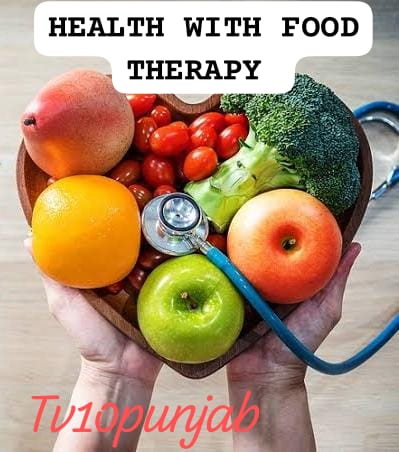Health Desk
Tv10punjab
🟢 Introduction: What Is Food Therapy?
Food therapy is a natural healing method that uses food as a medicine to prevent and treat diseases. It is based on the principle that the right diet can improve body functions and restore health. This approach has been used in traditional systems like Ayurveda, Traditional Chinese Medicine (TCM), and modern dietetics.
Today, food therapy is becoming more popular as people prefer natural methods to stay healthy and avoid the side effects of medications.

🟢 Benefits of Food Therapy
Improves digestion and gut health
Boosts immunity
Supports heart and brain health
Helps in diabetes control
Aids in weight loss
Reduces inflammation
Enhances mood and energy levels
🟢 Food Therapy in Common Conditions
🌿 1. For Diabetes
Helpful Foods: Whole grains, oats, bitter gourd (karela), fenugreek seeds, flaxseeds, green leafy vegetables
Foods to Avoid: Refined sugar, white rice, sweets, processed snacks
Why It Works: These foods regulate blood sugar levels and improve insulin sensitivity.
🌿 2. For High Blood Pressure
Helpful Foods: Garlic, bananas, beetroot, low-fat dairy, spinach
Foods to Avoid: Salt, pickles, fried foods, caffeine
Why It Works: These foods reduce blood pressure and improve blood vessel health.
🌿 3. For Weight Loss
Helpful Foods: Salads, soups, whole fruits, green tea, lemon water, nuts in moderation
Foods to Avoid: Soft drinks, chips, sweets, deep-fried items
Why It Works: Low-calorie, high-fiber foods keep you full and reduce unhealthy fat.
🌿 4. For Better Digestion
Helpful Foods: Yogurt, papaya, ginger, fennel seeds, fiber-rich vegetables
Foods to Avoid: Overcooked food, spicy food, alcohol, soda
Why It Works: Probiotics and enzymes help break down food and improve gut health.
🌿 5. For Immunity
Helpful Foods: Turmeric, tulsi leaves, amla, citrus fruits, almonds, mushrooms
Foods to Avoid: Sugary drinks, excessive caffeine, oily food
Why It Works: These are rich in antioxidants, vitamins (especially C, D, and E), and anti-inflammatory compounds.
🟢 Food Therapy by Age Group
👶 Children (1–12 years)
Focus on growth, brain development, and immunity.
Include milk, eggs, fruits, leafy greens, nuts, and whole grains.
👩🦰 Adults (18–60 years)
Focus on energy, stress reduction, and lifestyle disease prevention.
Include a balance of protein, carbs, fats, and fiber.
👵 Elderly (60+)
Focus on digestion, bone strength, and immunity.
Include soft, easy-to-digest foods, dairy, soups, fruits, and fewer spices.
🟢 Food Therapy for Mental Wellness
Foods for Mood Boosting: Dark chocolate, walnuts, bananas, oats
For Stress Relief: Herbal teas (like chamomile), tulsi, complex carbs
For Better Sleep: Warm milk, almonds, kiwi, herbal teas
🟢 Sample Food Therapy Diet Plan (General Health)
Time Meal Examples
Morning
Detox Drink Warm water + lemon + honey or jeera
Breakfast High-fiber meal Oats, fruit, or vegetable poha
Mid-morning Light snack Coconut water or fruit (papaya, apple)
Lunch Balanced thali Dal, chapati, sabzi, salad, curd
Evening Light snack Roasted chana or herbal tea
Dinner Light and early meal Khichdi, soup, or vegetable stew
Bedtime Sleep aid Turmeric milk or soaked almonds
🟢 Do’s and Don’ts of Food Therapy
Do’s
✅ Eat seasonal and local food
✅ Chew food slowly
✅ Include colorful fruits and vegetables
✅ Drink enough water
Don’ts
❌ Skip meals
❌ Eat processed food often
❌ Overuse supplements without advice
❌ Eat while watching TV or using phone
🟢 Conclusion
Food therapy is not just about eating healthy — it’s about eating with awareness. It connects body, mind, and food. By following simple dietary habits and using food as medicine, we can live a longer, healthier, and happier life.